人教版八年级上册英语导学案Unit 1:Section B2 (2a-2e)
新人教版初中英语八年级上册Unit 2 导学案

Unit 2 How often do you exercise?Period 1 Section A (1a-2c)学习目标知识目标1.口.笔头掌握以下句型A: What do you usually do on weekends? B : I usually exercise .A: What does he do on weekends ? B: He sometimes watches TV.A: How often does he surf the Internet?B: He surfs the internet once/twice /three times a week.2熟练掌握以下词汇:exercise , hardly , ever , once , twice , time, Internet, program.3.灵活运用以what 开头的一般现在时的特殊疑问句。
4.用how often 对动作频率进行提问,并掌握其答语。
技能目标:听懂用一般现在时谈论人们经常做某事的对话并熟练运用目标句型进行会话。
情感态度:通过学习,培养健康意识及良好的生活习惯。
课前准备I.将下列单词根据词义按照频率由高到低排列出来,并且译为中文。
hardly ever, sometimes , always , often, usually, never100%,_______( ),_______________ ( ),_______ ______( ), _______( ),________________( ),_____________ ( ),0%II.翻译词组。
watch TV_________________ go shopping _________________read a book _____________ exercise___________________III.列举你在周末通常做的活动。
人教版八年级英语上册Unit1 导学案

八年级上册英语导学案Unit1 Where did you go on vacation?第1课时Section A (1a-2c)知识目标1. 口、笔头掌握以下句型-Where did you go on vacation? -I went to the mountains.-Where did Tina go on vacation? -She went to the mountains.-Did you go with anyone? -Yes, I went with my mother.2.熟练掌握以下词汇:vacation, mountain, special, anyone技能目标:复习并掌握动词一般过去式的构成规律; 能用一般过去式叙述假期所做的事。
通过对过去事情的谈论,增进同学的相互了解。
1. 你能用英语写出下列短语吗?呆在家里_________ 去纽约市_________ 拜访我的叔叔_________去夏令营_________ 去爬山_________ 去海滩_________参观博物馆_________ 买特别的东西_________ 遇见有趣的的人_________做有趣的事情_________II. 回忆并默写出规则动词过去式的变化规则:1.______________2. ______________3. ______________4. ______________III. 做调查,问问你的同伴上个暑假都去了哪儿?Before listening1. 小组内交流课前准备1中的短语,并大声朗读三遍2. 两人一组,用课前准备III的内容对话。
3. Do 1a.观察与复习:1a 中用的动词是______时态。
规则动词过去式的变化规则是:(课前准备II)______________________ 练习:写出下列动词的过去式While listening1. 1b listen twice and number the people in the picture.2. 1c Pairwork. Make conversations about the people in the picture.3. 2a Listen twice and complete the chart.4. 2b Listen twice again and check Yes or No for each question.5. 模仿秀:听录音中的重点句段,反复跟读,模仿语音语调。
人教版英语八年级上册Unit1 SectionB(2a-2e)名师教案
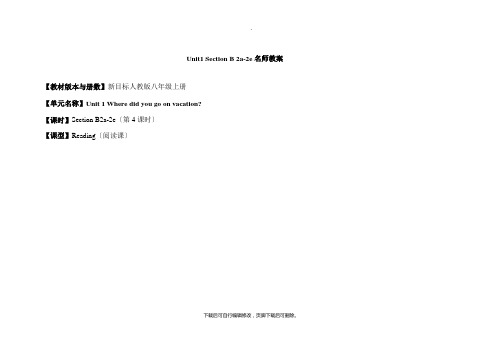
Unit1 Section B 2a-2e名师教案【教材版本与册数】新目标人教版八年级上册【单元名称】Unit 1 Where did you go on vacation?【课时】Section B2a-2e〔第4课时〕【课型】Reading〔阅读课〕下载后可自行编辑修改,页脚下载后可删除。
下载后可自行编辑修改,页脚下载后可删除。
下载后可自行编辑修改,页脚下载后可删除。
下载后可自行编辑修改,页脚下载后可删除。
下载后可自行编辑修改,页脚下载后可删除。
下载后可自行编辑修改,页脚下载后可删除。
附:教学活动设计下载后可自行编辑修改,页脚下载后可删除。
下载后可自行编辑修改,页脚下载后可删除。
下载后可自行编辑修改,页脚下载后可删除。
下载后可自行编辑修改,页脚下载后可删除。
with T.S: Ss read Jane’s first diary with questions and fill in the blanks.And check.答案:“read for information〞培养学生寻读的阅读技巧,表达scan 略读的阅读策略渗透。
巧完成任务。
下载后可自行编辑修改,页脚下载后可删除。
下载后可自行编辑修改,页脚下载后可删除。
S:Ss. read Jane’s diary entries again. Fill in thechart. Then check.答案:“read fo r information〞培养学生寻读的阅读技巧,表达scan 略读的阅读策略渗透。
下载后可自行编辑修改,页脚下载后可删除。
下载后可自行编辑修改,页脚下载后可删除。
下载后可自行编辑修改,页脚下载后可删除。
下载后可自行编辑修改,页脚下载后可删除。
Step6 practice and sum up 1.T: Let’s do some practice then check.S: Finish some exercise and check.培养学生重视文本构造来帮助我们读阅读和写作。
人教八年级上册英语Unit1导学案
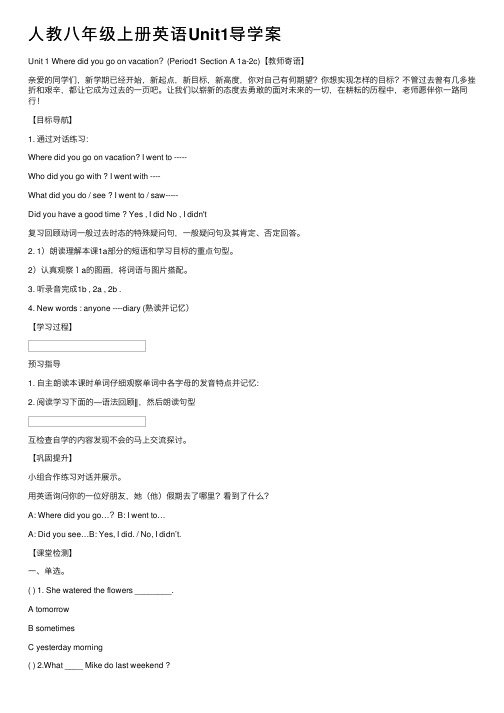
⼈教⼋年级上册英语Unit1导学案Unit 1 Where did you go on vacation?(Period1 Section A 1a-2c)【教师寄语】亲爱的同学们,新学期已经开始,新起点,新⽬标,新⾼度,你对⾃⼰有何期望?你想实现怎样的⽬标?不管过去曾有⼏多挫折和艰⾟,都让它成为过去的⼀页吧。
让我们以崭新的态度去勇敢的⾯对未来的⼀切,在耕耘的历程中,⽼师愿伴你⼀路同⾏!【⽬标导航】1. 通过对话练习:Where did you go on vacation? I went to -----Who did you go with ? I went with ----What did you do / see ? I went to / saw-----Did you have a good time ? Yes , I did No , I didn't复习回顾动词⼀般过去时态的特殊疑问句,⼀般疑问句及其肯定、否定回答。
2. 1)朗读理解本课1a部分的短语和学习⽬标的重点句型。
2)认真观察1a的图画,将词语与图⽚搭配。
3. 听录⾳完成1b , 2a , 2b .4. New words : anyone ----diary (熟读并记忆)【学习过程】预习指导1. ⾃主朗读本课时单词仔细观察单词中各字母的发⾳特点并记忆:2. 阅读学习下⾯的―语法回顾‖,然后朗读句型互检查⾃学的内容发现不会的马上交流探讨。
【巩固提升】⼩组合作练习对话并展⽰。
⽤英语询问你的⼀位好朋友,她(他)假期去了哪⾥?看到了什么?A: Where did you go…?B: I went to…A: Did you see…B: Yes, I did. / No, I didn’t.【课堂检测】⼀、单选。
( ) 1. She watered the flowers ________.A tomorrowB sometimesC yesterday morning( ) 2.What ____ Mike do last weekend ?A doB doesC did( ) 3. I often help my mother _____ housework.A doesB didC do( ) 4. _____ you _____ TV last night ?A Do, watchB Did, watchC Did, watched( ) 5.They _____ on a trip in February ,2007.A are goingB goingC went( ) 6.----Good afternoon, Miss Lee. How does Mike feel?-----He’s tired . He ____ a lot of work ______ .A does , this morningB do , this morningC did , this moring⼆、适当形式填空。
人教版八年级英语上册导学案(全册)

visit museums _______
Step C、考考你的迁移能力
1. Lucy usually______to school early. But today she ______to school late. (go)
2、运用一般过去时谈论过去的一天或一次旅行。
3.不规则动词过去式的归类记忆
【教学过程】
一、导入(启发探究3分钟)
StepA、试一试你能写出下列各词的过去式吗?
stay_________ do_________ stop_________play_________
is_________ go_______ buy_______ have _______
Step 1c
师生、生生操练
Where did you go on vacation? I went to New York City.
Did you go out with anyone? No, No one was here. Everyone was on vacation.
Did you buy anything special? Yes, I bought something for my father.
Step D、answer the questions:
How was your summer vacation ?
Where did you go on vacation?
Who did you go there with ?
What did you do there ?
二、自学(自主探究6分钟)
人教版八年级英语上册全册导学案

人教版八年级英语上册全册导学案【课题】 Unit1 How often do you exercise? Section A 1a-1c (1)(1课时)【学习目标】 1.识记周末活动的词汇和6个频度副词(always, usually, often , sometimes , hardly ever ,never)。
2.运用周末活动的词汇、频度副词及一般现在时简单谈论周末活动情况。
【重点,难点】 1.对6个频度副词细微差异的理解及使用。
2.弄清一般现在时在不同人称下动词形式及提问的变化。
【导学指导】知识链接:问:什么情况下使用一般现在时?答:简单讲,当动作经常、反复发生,表达习惯、爱好、客观规律和现在的状态时需使用一般现在时。
问:一般现在时的基本结构是什么?动词原形(当主语不是第三人称单数)答:主语+ 动词的第三人称单数形式(当主语是第三人称单数时)问:什么是动词的第三人称单数?什么又是主语的第三人称单数?答:变一个动词为其第三人称单数和变一个名词为其复数形式的规则大致一致,具体情况如下表: 1.直接加“s”。
2.以辅音字母加“y”结尾的动词,去“y”变“i”加“es”。
3.以“s、x、sh、ch”结尾的加“es”。
4.特殊记。
love―loves take―takes study―studies fly―flies try―tries fix―fixes teach―teaches wash―washes go―goes;do―does;have―has 而主语的第三人称单数形式是指除了“you(你)、I(我)”以外的所有单个的人或物或者不可数的事物。
自主互助学习一、自学: 1.仔细观察课本第一页图片,根据所给例子填写下列空格。
例:Picture a(图a): shop What is the girl in Picture a doing? She is shopping.Picture b:_______ a book What is the girl in Picture b doing? ______________________________Picture c:________ ________________________________?________________________________.Picture d:________ ______ ________________________________? ________________________________.Picture e:________ _______ _______________________________? ________________________________. 2.根据汉语提示,完成下列其他weekend activity (周末活动)短语。
2013新人教版八年级上册第一单元B部分2b导学案

UNIT 1 Section B 2b 导学案Ⅰ.Word活动决定尝试滑翔伞运动给...的感觉鸟自行车建筑物商人想知道差别顶部等待伞潮湿的因为(Phrase)在...下面充足的饥饿的Ⅱ.Notes on the Text1.Penang Hill(槟城山)与Weld Quay(海墘qiān街)槟城山俗名“升旗山”,是马来西亚一处重要的旅游景点。
海墘(qiān)街是槟城过去和现在的缩影。
这里既有大量历史古迹也不乏现代建筑。
Georgetown(乔治市)是槟城岛中心城市Malaysia(Malaysian)马来西亚(马来西亚的,人)东南亚著名旅游国家,农业资源丰富,著名景点有吉隆坡(首都)沙巴(登东南亚第一高峰,丛林探险)马六甲(海上生命线)热浪岛(游泳潜水)槟城(东方珍珠的美誉)-----此段老师根据教材与网页信息整理2.this morningthis morning是典型的一般过去时标志性时间状语,老师又写下了几个同样是一般过去时标志性时间状语:(long) ago,(the day before)yesterday,last week/night/year,month...,in 1989,just now,at the age of...,one day,once upon a time,then(那时),on that day.练习:①当我看到那条蛇时,我非常害怕。
②早上八点时我正在吃早餐。
2.同学们仔细就会发现,第二题貌似并不应该用一般过去时表示。
当一句话既有一般过去时标志性时间状语又有现在进行时标志性时间状语(正在)时,我们称这个句子为过去进行时。
例句:When(一般过去时标志)we got to the top, it was raining really hard.正在则在汉语翻译中体现过去进行时的定义:①过去某个时间正在发生的动作强调过去某刻②过去某段时间正在发生的动作正在进行的东西练习:①当我正在清扫我的房间时,我的朋友给我打电话。
八年级上英语unit1(SectionB 2a-2e)教学设计

Unit 1 When did you go on vacation?Lesson Plan (Section B 2a-2e)I.Teaching objectivesA. Knowledge objectivesa) Students are able to identify words such as decide, try, feel like, below, wonder and so on.b) Students are able to understand reading material which contains new words and phrases in this unit.B. Ability objectivesa) Students are able to get main ideas.b) Students are able to improve reading skills.C. Moral objectivesStudents are able to be active to know other countries’ custom.II.Teaching important pointsa) New words and phrases such as decide, try, feel like, below, wonder and so on.b) Ask others about holiday.III. Teaching difficult pointsa) Sentence pattern: We had something very special.b) Ask others about holiday.IV.Teaching aidsBlackboard, chalk, PPT, pictures.V.Teaching methodsCommunicative approach, Task-based teaching method.VI.Teaching proceduresStep1:Brainstorming1. List activities on vacation.go to the mountains, go to summer camp, go to the beach2. Finish 2a and check answer together.Step2: Work on 2b&2c1.Read the passage quickly and answer questions in 2b.2.Read the passage careful and complete the chart in 2c.3.Check the answers together.4.Read passage again and finish 2d and 2e.5. Check answers together.6. Read passage together.VII.Homework1.Write and translate passage in 2b.。
最新人教新目标八年级上册英语Unit 1 Where did you go on vacation全单元导学案

第1单元Where did you go on vacation?Section A 单词anyone pron.任何人anywhere adv.在任何地方wonderful adj.精彩的;绝妙的few adj.&pron.不多;很少most adj.,adv.&pron.最多;大多数something pron.某事;某物nothing pron.没有什么;没有一件东西everyone pron.每人;人人;所有人myself pron.我自己;我本人yourself pron.你自己;您自己hen n.母鸡pig n.猪seem v.好像;似乎;看来bored adj.厌倦的;烦闷的someone pron.某人diary n.日记;记事簿短语go on vacation去度假anything special什么特别的stay at home待在家里have a good time玩得开心quite a few相当多;不少of course当然;自然句型1.—Did you go out with anyone? 你和别人一起出去的吗?—No. No one was here. Everyone was on vacation.不。
没有人在这里。
大家都去度假了。
2.—How was the food? 食物怎么样?—Everything tasted really good! 每样东西尝起来都很美味!Section B 单词activity n.活动enjoyable adj.有乐趣的;令人愉快的decide v.决定;选定try v.& n.尝试;设法;努力bird n.鸟bicycle n.自行车;脚踏车building n.建筑物;房子trader n.商人wonder v.想知道;琢磨difference n.差别;差异top n.顶部;表面wait v.等待;等候umbrella n.伞;雨伞wet adj.湿的;潮湿的;下雨的duck n.鸭below prep.&adv.在……下面;到……下面hungry adj.饥饿的as adv.像……一样;如同conj.当……时;如同hill n.小山;山丘dislike v.&n.不喜爱(的事物);厌恶(的事物)enough adj.&adv.足够的(地);充足的(地);充分的(地)短语feel like给……的感觉;感受到because of因为arrive in到达 a lot of许多;大量的take some photos拍一些照片too many太多句型1.There are a lot of new buildings now, but many of the old buildings are still there. 现在那里有许多新的建筑物,但是许多老式的建筑物还在那里。
人教版英语八上Unit-1-Where-did-you-go-on-vacation?Section-B(2a-2e)教学教案
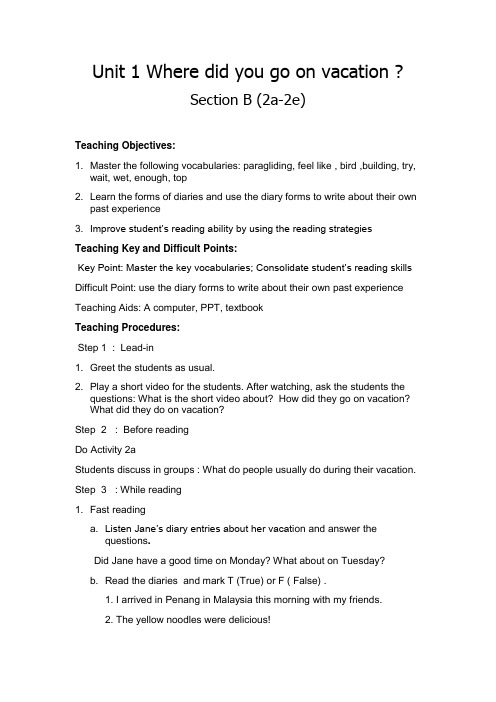
Unit 1 Where did you go on vacation ?Section B (2a-2e)Teaching Objectives:1. Master the following vocabularies: paragliding, feel like , bird ,building, try,wait, wet, enough, top2. Learn the forms of diaries and use the diary forms to write about their ownpast experience3. Improve student’s reading ability by using the reading strategies Teaching Key and Difficult Points:Key Point: Master the key vocabularies; Consolidate student’s reading skills Difficult Point: use the diary forms to write about their own past experience Teaching Aids: A computer, PPT, textbookTeaching Procedures:Step 1 : Lead-in1. Greet the students as usual.2. Play a short video for the students. After watching, ask the students thequestions: What is the short video about? How did they go on vacation?What did they do on vacation?Step 2 : Before readingDo Activity 2aStudents discuss in groups : What do people usually do during their vacation. Step 3 : While reading1. Fast readinga. Listen Jane’s diary entries about her vacati on and answer thequestions.Did Jane have a good time on Monday? What about on Tuesday?b. Read the diaries and mark T (True) or F ( False) .1. I arrived in Penang in Malaysia this morning with my friends.2. The yellow noodles were delicious!3. In the afternoon, we drove a car to Georgetown.4. My father and I decided to go to Penang Hill today.5. The weather on July 16th was fine.2. Careful readinga. Read Jane’s diary entries again. Fill in the chart in 2c .b. Complete the conversation about Jane’s trip to Penang using the information in the diary entries in 2d .Anna: Hi, Jane. Where did you go on vacation last week?Jane: I ______ to Penang in ___________.Anna: Who ______ you go with?Jane: I went with my _______.Anna: What did you do?Jane: The weather was hot and ________ on Monday, so we went_____________ on the beach. Then in the afternoon, we ______ bicycles to Georgetown.Anna: Sounds great!Jane: Well, but the next day was not as good. My ______ and I went to Penang Hill, but the weather ______ really bad and rainy. We _______ a long time for the train and we were _______ and cold because we forgot to bring an ___________.Anna: Oh, no!Jane: And that’s not all! We also didn’t bring _______ money, so we only had one bowl of rice and some fish.3. After readinga. Imagine Jane went to Penang Hill again and had a great day. Fill in the blanks in her diary entry with the correct forms of the verbs in brackets. Thursday, July 18thToday ______ (be) a beautiful day. My father and I ______ (go) to Penang Hill again, but this time we ______ (walk) to the top. We ______ (start) at 9:30 a.m. and ______ (see) lots of special Malaysian flowers along the way.About one hour later, we _______ (stop) and ______ (drink) some tea. Then we ______ (walk) for another twohours before we ______ (get) to the top. I _______ (be) quite tired, butthe city ______ (look) wonderful from the top of the hill!b The teacher shows a similar passage about travelling and students answer the questions according to the passage.Dear Sarah,We had a wonderful time here! On Monday we went to the science museum. We saw something interesting and bought some souvenirs(纪念品)in the shop there. Then we had lunch, and after that we came back to our hotel. We wrote some postcards and I sent you an e-mail. Did you get it?Yesterday it was very warm! We took a bus to the beach. We played beach volleyball there and swam in the sea. We found a lot of shells(贝壳)on the beach. We left the beach in the afternoon and got back to the hotel in the evening.I hope you are well.Jane1.Who is this letter from?2.Where did Jane go on Monday?3.What did Jane do after she came back from the museum?4.How did Jane go to the beach?5.When did Jane get back to the hotel yesterday?Step 4 : SummaryThe teacher summarizes what have learnt in this period with students.Step 5 : HomeworkWrite a composition about your vacation.。
人教版八年级英语(上册)导学案(全册)
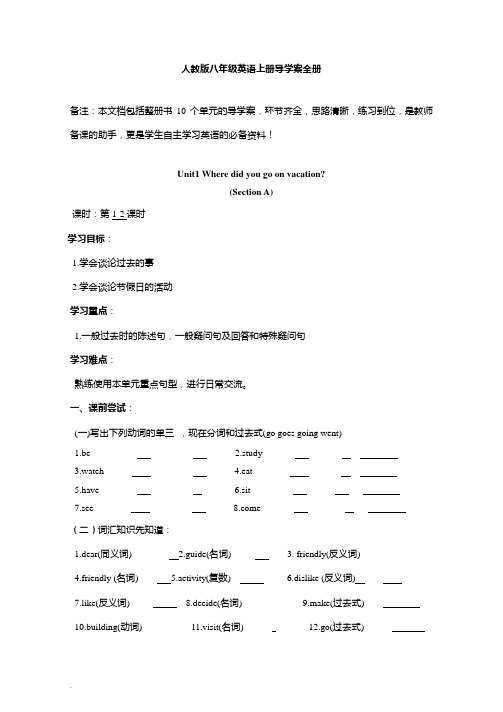
人教版八年级英语上册导学案全册备注:本文档包括整册书10个单元的导学案,环节齐全,思路清晰,练习到位,是教师备课的助手,更是学生自主学习英语的必备资料!Unit1 Where did you go on vacation?(Section A)课时:第1-2课时学习目标:1.学会谈论过去的事2.学会谈论节假日的活动学习重点:1.一般过去时的陈述句,一般疑问句及回答和特殊疑问句学习难点:熟练使用本单元重点句型,进行日常交流。
一、课前尝试:(一)写出下列动词的单三,现在分词和过去式(go goes going went)1.be _____ ______ _____2.study _____ ______ _____3.watch _____ ______ _____4.eat _____ ______ _____5.have _____ ______ _____6.sit _____ ______ _____7.see _____ ______ _____ e _____ ______ _____ (二)词汇知识先知道:1.dear(同义词)________2.guide(名词)_____ _3. friendly(反义词)_______4.friendly (名词)_____5.activity(复数)__6.dislike (反义词) ____7.like(反义词)_____ 8.decide(名词)___________ 9.make(过去式)____10.building(动词) ________ 11.visit(名词)____________ 12.go(过去式)______13.wait (名词) ___________ 14.difference(形容词)____ 15.cry(现在分词)___ (三) 短语互译:1.呆在家里__________2.由于__________3.看望我叔叔_________4.去夏令营___________5.去爬山________6.去海滩__________二、课堂探究(一)Do you know how to talk about past events? 你知道如何谈论过去发生的事吗? (二)How to ask the weather?1. What’s the weath er like today ? 同义句____________________翻译___________________2. What was the weather like yesterday? 同义句________________翻译___________________(三)To talk about“ What did you do on vacation?”(四)用所给词的适当形式填空1. Jim and Bob ___________ (come) to China last month.2. LiLei _________________(not go) to bed until 12 o’clock last night.So he ______ (get ) up late.3. Anna __________ (read) English yesterday morning.4. There _________ (be) no one here a moment ago.5. I ___________ (call) Lucy this morning.6. I listened but ___________ (hear) nothing.7. Mary ___________ (begin) to learn Chinese last year.8. Last week we _________ (pick) many apples on the farm.三、课后检测:(一)用所给词的适当形式填空1. Jack ______ (be) often late for school last term.2. It was ______ (rain) yesterday but it is sunny today.3. We have great fun _______ (learn) English.4. The dog made the baby ________ (cry).5. Can you help me ________ (study) English?6. What ______ you _______last night? (do)7. We ______(go) to the museum yesterday. It was _____(crowd).8. Lucy _______(write) two letters to her friends two days ago.(二)认真阅读下列句子, 选出最佳答案.( )1.How __________ your vacation? - It was pretty good.A. wasB. wereC. didD. is( )2.Where __________ they go yesterday? They went to the Summer Palace.A. areB. doC. didD. were( )3. --- Where did you go on vacation? I __________ my grandma.A. visitB. visitedC. visitsD. am visiting( )4.Betty stayed at home and __________ for the test last weekend.A. studyB. studyedC. studied D studies四、作业设计:单项选择()1.The boys are having great fun ______ in the waves.A.play B.to play C.played D.playing()2.Thank you very much for_________us so well.A.teachB. teachingC.teachesD.taught()3. How’s the weather in Shanghai ? _________.A. It raining.B. It is rainC.It is rainy.D.It rainy.()4.It has five _______ years of history.A. thousand B.thousands C.thousand of D.thousands of ()5.—When _______ a sports meeting? ---Last Monday.A.had you B.do you have C.did you have D.will you have()6. How is it going? ______.A.It's sunny. B.It's hot. C.It's right. D.It's pretty good()7.Listen! Who ________?A. sings so wellB. is sing so wellC. is singing so wellD. singing so well( ) 8. “You are a very beautiful girl.” “________”A. No, I’m not.B. Sorry, I don’t.C. Thank you.D. Yes, I do. ( ) 9 He didn’t have_____ money for a taxi, ______ he walked back to the hotel.A. any, andB. much, becauseC. any, soD. some, so( ) 10. On Sunday morning I helped my mother ____ the cooking.A. doB. to doingC. doesD. doing( ) 11.---__________ ? ---He did some reading at home.A. What does your father do yesterday eveningB .What does your brother do in the schoolC. What did your brother do over the weekendD. Where did your brother go last SundayUnit 1 Where did you go on vacation?(Section B)课时:第3-4课时学习目标:1.学会如何用一般过去时谈论发生在过去的事情学习重点:一般过去时学习难点:How to use keep,enough and such…that correctly学习过程:一、课前尝试:(一)英汉互译:(一)熟读Section B 3a,然后完成下列英汉互译1.发现某人正在做某事_______________2.丢失,失踪, 迷路____________________3.帮助某人做某事__________________4.使得某人……做某事__________________5.决定去做某事___________________6.走回某地_______________________7. 打排球______________________ 8.干……事很愉快__________________9.记日记_______ 10.the Palace Museum_________11.整天________________ 12.步行回到某地________________二、课堂探究:(一)enough的用法(二)1.so +形容词或者副词+that+从句意思是:如此...以致于结果状语从句2.such +a /an + 形容词+名词+that+从句,当名次是不可数或者复数时,用such +形容词+不可数名词或者复数+that+从句Those are such beautiful flowers that we all like them. 3.too+形容词或者副词+to do sth 意思是:太...而不能The boy is too young to carry the box.4.形容词/副词+enough +to do sth 意思是:...足够去做某事The boy is old enough to go to school.实战演练: 同义句转换1.This is so heavy a box that I can't carry it2.This is a heavy box I can't carry it3.This box is heavy me carry4.This box isn't carry三、课后检测:(一)根据所给句意及首字母提示完成下列单词拼写使句意通顺完整。
人教版初中英语八年级上册第1单元Section B(2a-2e)教学教案和教学反思
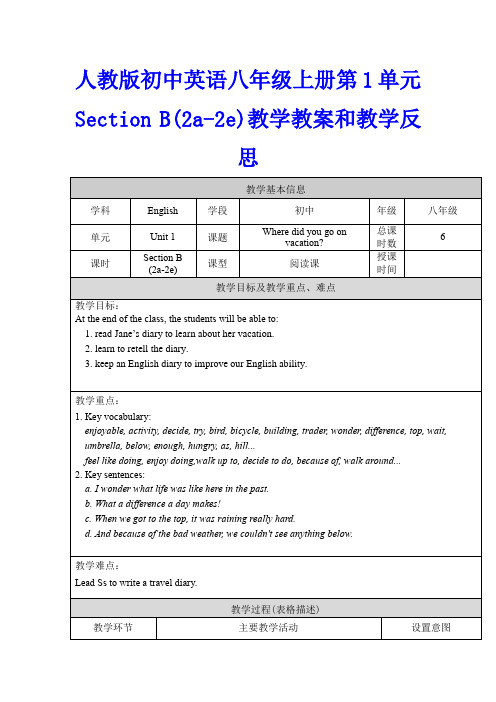
1.Keyvocabulary:
enjoyable, activity, decide, try, bird, bicycle, building, trader, wonder, difference, top, wait,
umbrella, below, enough, hungry, as, hill...
设计了几幅关于马来西亚的图片,激发学生的学习兴趣。
Step 3
Pre-reading
(PPT 8)
Make Ss discuss the questions with partners.
What do people usually do on vacation?
What activities do you find enjoyable?
通过图例、表格、对比等方式使学生加深对below, decide...等单词用法和so...that....等结构的理解。
Step 8
Exercises
(PPT 30-32)
Practice the language points by these exercises.
通过词形填空、汉译英等形式练习所学的语言点。
讨论问题并回答这些问题,激发学生对Jane’s diary的好奇。
Step 4
While-reading
(PPT 9-18)
Fast reading:
Make Ss read Jane’s diary entries about her vacation and answer the questions.
2.Work in groups.
根据导图复述两篇日记的主要内容,以此训练学生们的逻辑思维能力。
人教新目标八年级英语上册全英版教案:Unit1Wheredidyougoonvacation_SectionB(2a-2e)
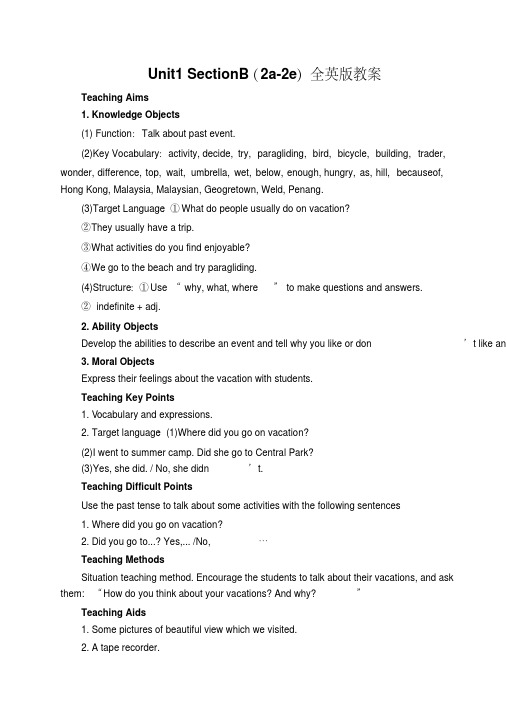
Unit1 SectionB(2a-2e)全英版教案Teaching Aims1. Knowledge Objects(1) Function:Talk about past event.(2)Key Vocabulary:activity, decide, try, paragliding, bird, bicycle, building, trader,wonder, difference, top, wait, umbrella, wet, below, enough, hungry, as, hill, because o f,Hong Kong, Malaysia, Malaysian, Geogretown, Weld, Penang.(3)Target Language:①What do people usually do on vacation?②They usually have a trip.③What activities do you find enjoyable?④We go to the beach and try paragliding.(4)Structure:①Use “ why, what, where” to make questions and answers.②indefinite + adj.2. Ability ObjectsDevelop the abilities to describe an event and tell why you like or don’t like an3. Moral ObjectsExpress their feelings about the vacation with students.Teaching Key Points1. Vocabulary and expressions.2. Target language:(1)Where did you go on vacation?(2)I went to summer camp. Did she go to Central Park?(3)Yes, she did. / No, she didn’t.Teaching Difficult PointsUse the past tense to talk about some activities with the following sentences :1. Where did you go on vacation?2. Did you go to...? Yes,... /No,…Teaching MethodsSituation teaching method. Encourage the students to talk about their vacations, and askthem: “How do you think about your vacations? And why?”Teaching Aids1. Some pictures of beautiful view which we visited.2. A tape recorder.Teaching ProceduresStep 1 Greeting (about 2 minutes)T:Good morning, class!S:Good morning, teacher!T:Do you like vacation?S1:Yes.T:Do you enjoy your trip?S2:Yes.Step 2 2a (about 6 minutes)T:Where do you usually do on your vacation?S1:I usually visit my uncle in Shanghai.S2:I go to summer camp.S3:I go to the beach.T:It is wonderful! Well, what activities do you think enjoyable?S1:Swimming. I like swimming in the river.S2:Go shopping. And I always buy many interesting things.T:This is a writing of Janet’s diary. Let’s read the text, and think:Did Jane have a goodtime on Monday? What about on Tuesday?Objects:Review the simple present tense.Attention:Some students may be confused. So the teacher should summarize the simple present tense and past tense.Step 3 2b (about 8 minutes)Read the new words, then read the text and know each sentence. F ind the important phrases, then learn them.T:Now let’s read the new words from “activity, decide, try, paragliding, bird, bicycle, building, trader, wonder, difference, top, wait, umbrella, wet, below, enough, hungry, as.T:Read the text and know each sentences of the text. You have three minutes to finishthen. If you don’t understand the meanings, you can ask your classmates or the teacher.T:Then let’s read the text again, please find the important phrases, and talk with your desk mates, then share your work with us.T:Which phrase is important?S1:decide to do...T:What’s the Chinese meaning?Students explain.T:Can you give an example?S1:It is raining heavily, but we decide to go out to eat dinner.T:Good job.Learn the other phrases like this.T:Read the text again. Then answer the questions you have. (key:1. Yes, she did. 2. Jane didn’t have a good time because of the bad weather.)Objects:Learn the new passage, and phrases.Attention:Some important phrases like decide to do, try doing, feel like, enjoy doing, because of....Step 4 2c (about 10 minutes)Read the passage again and finish 2c.Pay attention to these phrases:(decide to do, decide on, try doing, try to do, try one best to do, feel like, look like, enjoy doing, start doing, because of, enough + n. ) the teacher should make examples for students. And then the teacher can design some exercise to help the students to learn them.e. g.:decide to do:We decided to buy a new book for our teacher.try doing:My little sister tried riding the bike.try to do:We tried to open the door with the key.:I tried my best to study well.try one’s best to dofeel like:I felt like I flew into sky.look like:The flower looks like a butterfly.enjoy doing sth.:They enjoyed playing basketball.start doing sth.:Let’s start reading.because of:We can’t climb the mountain because of the bad weather.enough+ n.:We didn’t have enough time to go shopping.Objects:Emphasize the important phrases.Attention:Expand some phrases. These phrases are also important.Step 5 2d (about 5 minutes)。
人教八年级英语上册-Unit 1 Section B 2a-2e(附音频)

Check answers:
1. Who did Jane go on vacation with? With her family.
2. Where did they arrive in the morning? Penang in Malaysia.
3. How was the weather? It was sunny and hot.
/bɪ'ləʊ/ /ɪ'nʌf/
adj.饥饿的
/'hʌŋɡri/
adv.像……一样;如同 conj. 当……时;如同
/æz;əz/
n.小山;山丘
/hɪl/
below enough hungry as hill
New phrases
feel like such as because of arrive in too many
例:好像马上就要下雨了。 It feels like rain soon.
我现在什么都不想吃。 I feel like eating nothing now.
feel like doing sth. 想要(做)某事 = would like to do sth. = want to do sth. 例:你想跟我在公园里散步吗? Do you feel like taking a walk in the park with me? = Would you like to take a walk in the park with me? = Do you want to take a walk in the park with me?
3. I felt like I was a bird. 我感觉自己像一只小鸟。
felt 是feel的过去式,feel like在此是动词短语。
2019八年级英语上册 Unit 1 Where did you go on vacation Section B(2a-2e)学案

Unit1 Where did you go on vacation?第四课时 Section B (2a-2e)Before reading1.小组之间核对课前准备I。
并大声朗读。
2. 俩俩对话。
1. What do people usually do on vacation?2. What activities do you find enjoyable?While reading1. Fast reading: 快速阅读,回答问题。
Did Jane have a good time on Monday? What about on Tuesday?____________________________________________________2. Careful reading: Read Jane’s diary entries again. Fill in the chart.(2c)3.开心模仿秀,跟读录音注意语音和语调。
然后大声朗读5分钟。
4.根据2c,试着复述短文。
观察与思考1. I arriv ed in Penang in Malaysia this morning with my family.arrive in “到达…” arrive in+大地方,arrive at+小地方; 我们还学过哪些表示“到达”的词或短语_______________________________________________________________________________2. We decided to go to the beach near our hotel.decide to do sth. 决定做某事 = make a ________ to do sth.3. Because of the the bad weather, we couldn’t see anything below.=We couldn’t see anything below because the weather was bad.你能总结出because 和 because of 的区别吗?because后跟_________________ because of后跟_____________________1. 2d Complete the conversation about Jane’s trip to Penang using the information in the diary entries.Then read aloud for some time.2. 2e Imagine Jane went to Penang Hill again and had a great day. Fill in the blanks in her diary entry with the correct forms of the verbs in brackets. Then read aloud to recite.I. 下列句子或对话中均有一处错误,请找出并改正。
- 1、下载文档前请自行甄别文档内容的完整性,平台不提供额外的编辑、内容补充、找答案等附加服务。
- 2、"仅部分预览"的文档,不可在线预览部分如存在完整性等问题,可反馈申请退款(可完整预览的文档不适用该条件!)。
- 3、如文档侵犯您的权益,请联系客服反馈,我们会尽快为您处理(人工客服工作时间:9:00-18:30)。
Unit 1 Where did you go on vacation?Section B 2 (2a-2e)【学习目标】1.理解并掌握下列词汇及短语:enjoyable, activity, decide, try, feel like, bicycle, building, wonder, trader, difference, top, wait, umbrella, wet, because of, below, enough, hungry, as, hill,2. 理解并掌握下列重点句子:I arrived in Penang in Malaysia this morning with my family.We decided to go to the beach near our hotel.I felt like I was a bird.I wonder what life was like here in the past.We waited over an hour for the train.Because of the bad weather, we couldn’t see anything below.3. 了解Jane的假期经历,培养阅读技能。
4. 通过对文章的学习,了解马来西亚槟城山和海墘街,增进对其他国家的了解。
能够合理安排假期生活,让你的假期生活更加有意义。
【重点和难点】1) 知识点。
2)为学写英文旅游日记做准备。
【课前预习】课前预习一、词汇识记活动________ 决定;选定________ 尝试;努力________商人________ 想知道;琢磨________ 差别;差异________等候;等待________ 伞;雨伞________ 足够的;充分的________饥饿的________二、你能用英语写出下列短语吗?1) 到达________________ 2) 今天早晨_______________ 3)决定做某事________________ 4) 感觉像________________5)骑自行车去…_____________ 6) 在过去_______________7) 喜欢做某事_____________ 8) 开始做某事______________ 9) 等待… __________________ 10) 雨下的真的很大______________ 11) 因为… _________________【合作探究】探究一篇章理解1. Fast readingWhat do you think of the trip of each diary?The first dairy: The ________ trip in Penang.The second dairy: The _________ trip in Penang.2. Careful reading完成2c。
3. Post reading完成2d, 2e。
找出更多短语:试着做某事_____________ 四处走走_____________走到顶部_____________ 太多的人_____________探究二语言点1. I arrived in Penang in Malaysia this morning with my family. arrive in 到达…arrive in+大地方,arrive at+小地方;表示“到达”的单词或短语:___________________________________________________________2. We decided to go to the beach near our hotel.decide to do sth. 决定做某事= make a ________ to do sth.3. Because of the bad weather, we couldn’t see anything below.=We couldn’t see anything below because the weather was bad.总结because和because of 的区别:because后跟___________ because of后跟_____________4. feel like想要做……,与would like、want意义相近。
区别:1) I don’t feel like walking very much today. 我今天不太想散步feel like + _________2) I would like to buy a new computer. 我想要买一台新电脑。
would like+ ___________3) Do you want to go shopping with me? 你想和我去购物吗?want + ____________5. My sister and I tried paragliding.1) Please try to finish the work in 30 minutes.请尽量在三十分钟内完成这项工作。
2) Why not try riding a bike to school?为什么不试着骑车去学校呢?3) I will try my best to help you.我要尽我最大的努力来帮助你。
4) After a few tries, they decided to give up.试了几次后,他们决定放弃。
总结try常用结构的含义:try to do sth. ____________try doing sth. ____________try one’s best to do sth. ____________6. enough观察思考1) You have enough time to get there on time.Are there cakes enough for everyone?enough adj. 修饰名词时,可以位于名词____,也可以位于名词_____。
2) The house isn’t big enough for us.enough adv. 修饰形容词时,应置于该形容词_____来修饰。
7. We waited over an hour for the train because there were too many people.翻译:________________________________________________too many 修饰too much修饰much too 修饰【课时小结】短语:because of 因为in the past 在过去too many people 太多的人try doing sth. 试着做某事walk around 四处走走arrive in 到达walk up to the top 走到顶部rain hard 雨下的大句型:We decided to go to the beach near our hotel.I felt like I was a bird.I wonder what life was like here in the past.【达标检测】I. 根据句意和汉语提示完成单词。
1. It’s going to rain today. You should take an ________ (雨伞) with you.2. There are some ________ (不同) between the Chinese culture and the Japanese culture.3. Could you give me something to eat? I’m very ________ (饥饿的).4. I think the little girl under the tree is ________ (等待) for her mother.5. There are some new ________ (建筑物) in my hometown.Ⅱ. 根据汉语意思完成英语句子,每空一词。
1. 你经常感冒,我觉得你需要运动。
You often have a cold. I ________ ________ you need to do sports.2. 因为天气不好,我们没去爬山。
________ ________ the bad weather, we didn't go to the mountains.3. 让我们试着用另一种方法来做这道练习题。
Let's ________ ________ the exercise in another way.4. 第二天我们去了一个小村庄。
________ ________ ________ we went to a small village.5. 水足够热吗?Is the water ________ ________?【自我评价】1. 本课我学会了什么?___________________________________________________________2. 通过本课的学习,我还有哪些疑问?___________________________________________________________【教师寄语】Nothing is impossible to a willing heart. 世上无难事,只要肯登攀。
参考答案:【课前预习】一、activity, decide, try, trader, wonder, difference, wait, umbrella, enough, hungry二、1) arrive in 2) this morning 3) decide to do sth. 4) feel like5) ride bicycles to… 6) in the past 7) enjoying doing sth.8) start doing sth. 9) wait for… 10) rain really hard 11) because of【合作探究】探究一1. exciting; terrible2. (1) sunny and hot (2) tried paragliding (3) yellow noodles (4) enjoyable (5) rainy (6) her father(7) the bad weather (8) terrible3. try doing sth., walk around, walk up to the top, too many people 探究二1. get to, reach2. decision3. 从句,短语4. (1) doing (2) to do (3) to do5. 尽力做某事,试着做某事,尽某人最大的努力做某事6. 前面,后面;后面7. 因为人太多,我们等了一个多小时的火车。
